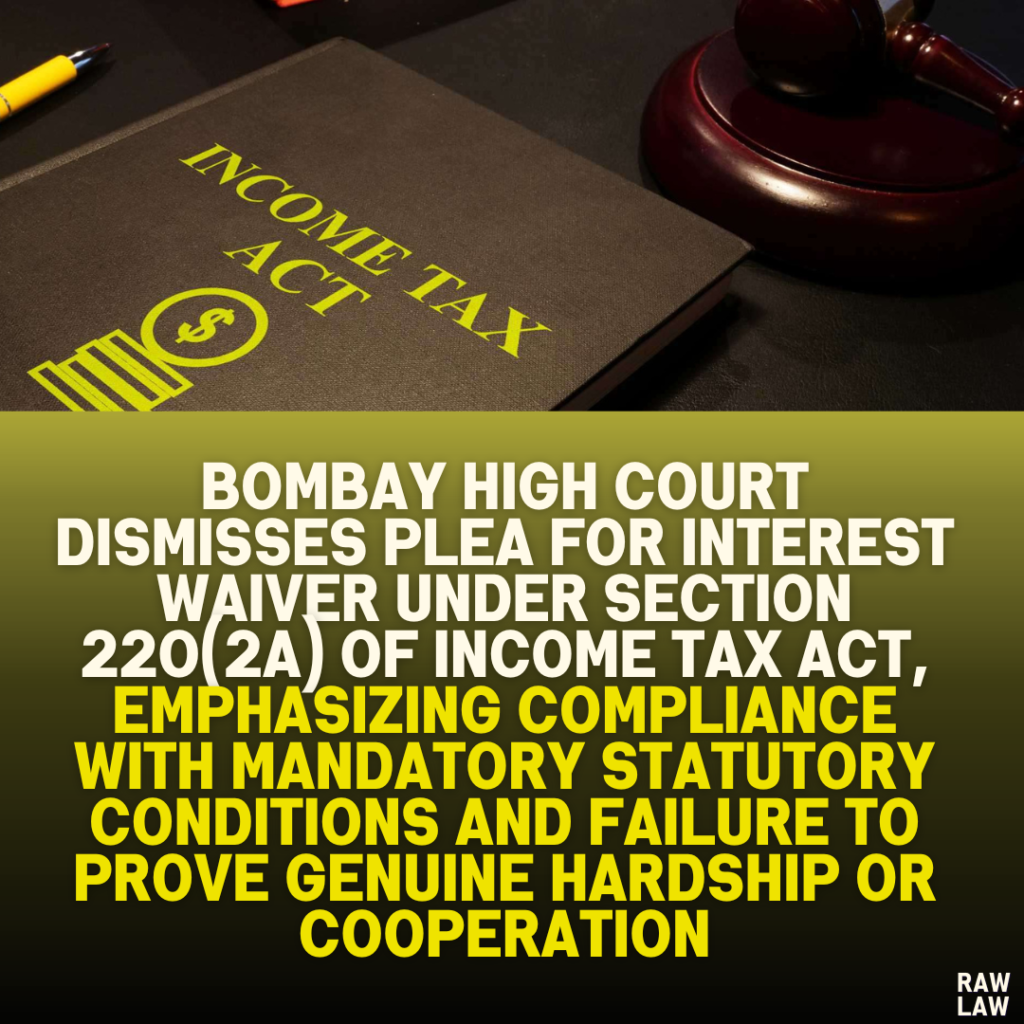Court’s Decision
The Bombay High Court dismissed a writ petition filed against the Chief Commissioner of Income Tax’s rejection of a waiver application under Section 220(2A) of the Income Tax Act, 1961. The court held that the petitioner failed to satisfy the mandatory statutory conditions for waiver, observing that the Chief Commissioner’s findings were reasonable, well-supported by evidence, and free from legal or factual perversity.
Facts
- Background of the Case:
- A tax search conducted in 2007 led to the seizure of the petitioner’s movable assets, including gold bars, jewelry, cash, and investments valued at ₹71,35,730.
- Despite repeated requests by the petitioner, the seized assets were not liquidated to pay the tax demands.
- The petitioner filed an application for waiver of interest under Section 220(2A) in February 2019, citing financial hardship, age, and health issues as reasons for seeking relief.
- Administrative Action:
- The Chief Commissioner rejected the waiver application in February 2020, citing inconsistencies in the petitioner’s claims, lack of credible financial disclosures, and non-cooperation during the inquiry process.
Issues
- Did the petitioner fulfill the statutory conditions under Section 220(2A) to warrant a waiver of interest?
- Was the rejection of the waiver application justified based on the evidence and circumstances?
Petitioner’s Arguments
- Hardship Due to Seizure:
- The petitioner argued that failure to liquidate seized assets despite repeated requests caused undue hardship, leading to delays in payment of tax and interest.
- It was claimed that the petitioner had to sell property to settle tax liabilities.
- Compliance with Requirements:
- The petitioner contended that he was not required to maintain a balance sheet, and the Chief Commissioner’s insistence on one was irrelevant.
- Alleged that financial position at the time of the waiver request, not historical data, should have been considered.
- Department’s Inaction:
- The petitioner accused the department of contributing to delays by not acting on requests to sell seized assets.
- Cited Chander Prakash Jain v. CIT, where failure to encash seized investments was held relevant for granting relief.
Respondent’s Arguments
- Inconsistent Stances:
- The respondents pointed to contradictory instructions from the petitioner regarding the sale of seized assets, undermining claims of departmental delay.
- Highlighted petitioner’s communication requesting assets to be retained as security until appeals were resolved.
- Failure to Prove Hardship:
- Emphasized the petitioner’s failure to provide adequate financial disclosures, such as balance sheets or statements of assets and liabilities, to substantiate claims of hardship.
- Legal Parameters:
- Asserted that the petitioner failed to meet all three statutory conditions under Section 220(2A), making the waiver inapplicable.
Analysis of the Law
Under Section 220(2A) of the Income Tax Act, waiver of interest is permissible only if the following three conditions are met:
- Genuine Hardship: The assessee must prove that paying interest causes significant financial difficulty.
- Circumstances Beyond Control: The delay or default in payment must result from uncontrollable external factors.
- Cooperation: The assessee must have fully cooperated during the inquiry or proceedings.
The court reiterated the principle laid down in B.M. Malani v. Commissioner of Income Tax, which held that all three conditions must coexist for a waiver to be granted.
Precedent Analysis
- Chander Prakash Jain v. CIT:
- Distinguished as inapplicable, as the case involved a different factual matrix and did not concern Section 220(2A).
- B.M. Malani v. CIT:
- The court followed this precedent to emphasize the mandatory nature of satisfying all statutory conditions for relief.
Court’s Reasoning
- Genuine Hardship:
- The petitioner failed to provide credible evidence, such as a balance sheet or financial disclosures, to prove hardship.
- The Chief Commissioner found that the petitioner benefited from the appreciation in the value of seized gold and diamonds, contradicting claims of financial distress.
- Circumstances Beyond Control:
- The petitioner’s inconsistent instructions regarding the disposal of assets undermined claims of uncontrollable delays.
- Requests to retain seized assets as security during pending appeals indicated voluntary choices rather than uncontrollable circumstances.
- Cooperation:
- The petitioner’s conflicting statements about the status and disposition of assets reflected a lack of full cooperation.
- The court observed that mere non-seizure of personal jewelry and other allowances by the department did not establish cooperation.
- Procedural Fairness:
- The court found no procedural irregularities in the Chief Commissioner’s decision-making process.
- The petitioner’s claim of being denied an opportunity to present explanations was dismissed, as adequate chances were provided.
- Factual Findings:
- The Chief Commissioner’s findings regarding the petitioner’s inconsistent conduct, appreciation in asset value, and failure to disclose financial details were upheld as reasonable and supported by evidence.
Conclusion
The High Court dismissed the writ petition, affirming the Chief Commissioner’s findings that the petitioner:
- Failed to establish genuine hardship or uncontrollable circumstances.
- Did not fully cooperate with the inquiry process.
- Benefited from the appreciation in seized asset value, negating claims of financial loss.
The court emphasized that judicial review does not extend to re-evaluating well-reasoned administrative decisions unless they are perverse, unreasonable, or unsupported by evidence.
Implications
- The judgment reinforces the stringent criteria for securing interest waivers under Section 220(2A).
- It highlights the importance of consistency, full disclosure, and credible evidence in applications for tax relief.
- The decision serves as a reminder of the limited scope of judicial review in discretionary administrative actions.



